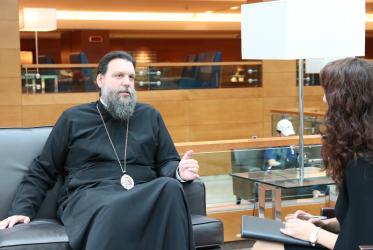Displaying 1 - 18 of 18
How can you help refugees?
11 October 2018
In Lebanon, refugees face hardship - but find hope
16 March 2017
Strong bridges needed more than ever
21 December 2016
WCC speaks on behalf of forcibly displaced persons
28 June 2016
One refugee’s story: from Syria to France
07 January 2016
WCC delegation met with Syria's Assad
24 April 2008






!["All Iraqis are trying to leave," Clara - a young woman working for the Greek Orthodox Patriarchate in Damascus and a refugee herself - told the WCC delegation. "Since one year the United Nations tell us that they will find a solution [for Iraqi refugees in the region], but nothing happens." "All Iraqis are trying to leave," Clara - a young woman working for the Greek Orthodox Patriarchate in Damascus and a refugee herself - told the WCC delegation. "Since one year the United Nations tell us that they will find a solution [for Iraqi refugees in the region], but nothing happens."](/sites/default/files/styles/teaser/public/newsItem/wjV59XHs.jpeg?itok=YIkp9xNl)



